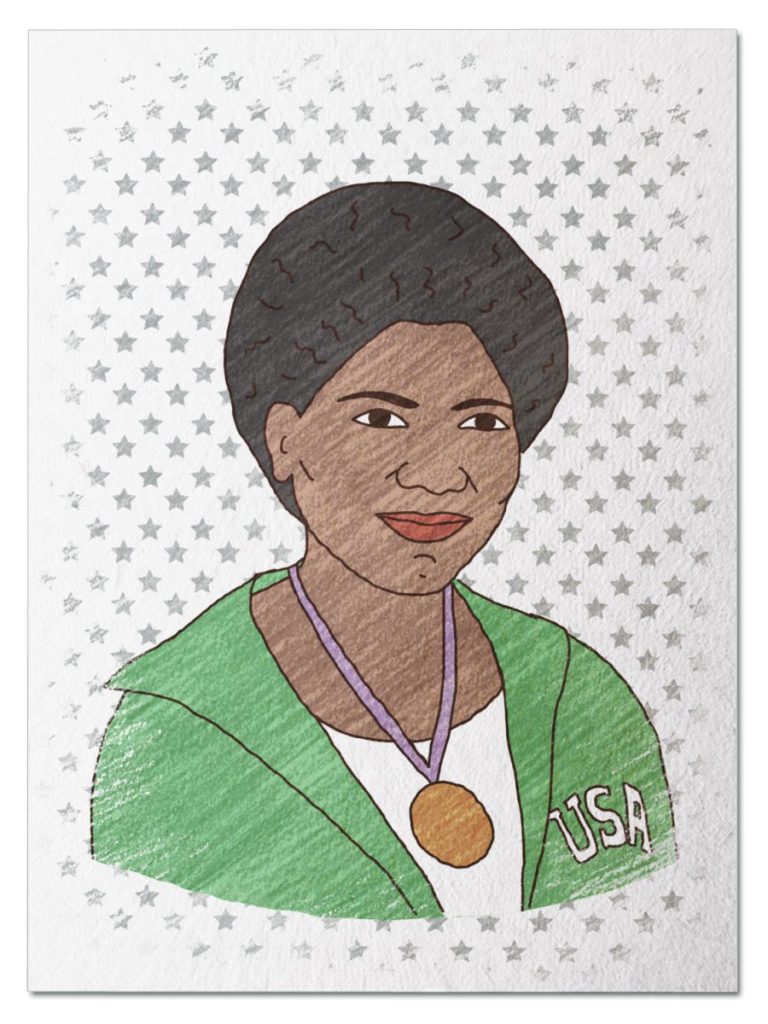
Awesome Athlete
She signed up for her college rowing team on a whim just as the sport began taking off for women and earned a spot on the 1976 U.S. Olympic Team when women’s rowing was added as an event. While she was thrilled to earn a bronze medal, she set her sights on a gold and trained for four more years, only to face her dream disappearing when the United States decided to boycott the 1980 Olympics. She stood alone and fought what turned out to be a losing battle to preserve her Olympic hopes and then turned her passion into a career supporting other Olympic athletes. Travel back in time to 1979 and meet Anita De Franz…
Her Ruby Shoe Moment
The Power of the Wand
Her Yellow Brick Road
Brains, Heart & Courage
Glinda’s Gallery
Just the Facts
Her Ruby Shoe Moment
Anita De Franz stared at the television in shock. It was January 20, 1979, and President Jimmy Carter announced that the United States would consider boycotting the 1980 Olympic Games in Moscow, in response to the Soviet Union’s invasion of Afghanistan.
A few weeks later, Congress took action on President Carter’s suggestion. Both the House of Representatives and the Senate passed resolutions opposing the US participation in the 1980 Games unless the USSR withdrew its troops from Afghanistan within one month. Anita was confused — what was the connection between a boycott and politics? What would it accomplish? Would a boycott save any lives?
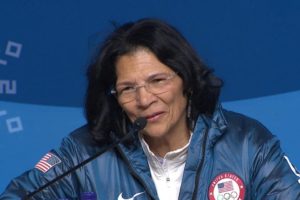
anitadefranz.com
Anita couldn’t believe what was happening. She had spent the last four years of her life training for the 1980 Games. In fact, she took a one year leave of absence from her job as a lawyer to train full-time with the US National Rowing Team at Princeton University. And it was her last chance to participate in the Olympic Games.
Over 400 other athletes were in the same position as Anita. They had worked hard towards their goal and put their lives on hold to train for the 1980 Games. It was a big sacrifice. There were no sponsorship opportunities for athletes back then, so they each paid for their own training expenses. For some athletes, the 1980 Games was their only chance to compete in the Olympics. Since Anita had attended the 1976 Games, she knew what an amazing experience they would be missing if the US boycotted the 1980 Games.
Anita went to law school to help people stand up for their rights. She couldn’t stand by and watch their dreams evaporate because of Cold War politics. So she decided to fight the boycott — she set up a war room in her apartment; she gathered all the documents that could help her cause; she called politicians; she was interviewed in newspapers; she held press conferences; she she attended meetings at the State Department; she testified before the Senate Foreign Relations Committee; and she talked to other athletes.
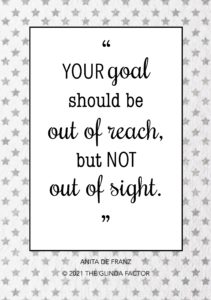 At the time, Anita was on the Executive Board of the US Olympic Committee. The USOC (and not the federal government) made the final decision about whether the US Olympic Team would boycott the Moscow Games. The Executive Board held an emergency board meeting to discuss the boycott in May, 1980. At the end of the meeting, the vote was 9-1 in favor of a boycott. Anita was the lone dissenter.
At the time, Anita was on the Executive Board of the US Olympic Committee. The USOC (and not the federal government) made the final decision about whether the US Olympic Team would boycott the Moscow Games. The Executive Board held an emergency board meeting to discuss the boycott in May, 1980. At the end of the meeting, the vote was 9-1 in favor of a boycott. Anita was the lone dissenter.
Anita decided it was time to ask the courts to intervene. On May 16, 1980, the ACLU filed a class action lawsuit against the USOC on behalf of 25 athletes (including Anita), 1 coach, and 1 USOC board member. The lawsuit argued that USOC infringed on the athlete’s constitutional right to compete when it approved the boycott, and asked for an injunction to prevent the boycott. And they lost. The court dismissed the lawsuit. They appealed, but lost again. It was over.
Anita was bitterly disappointed about not attending the 1980 Olympic Games. But the defeat helped her realize how passionate she felt about the Olympic Movement. And she has spent her career advocating for athlete’s rights and amateur sports at the local, national and international level. In fact, she was the first woman to represent America on the International Olympic Committee.
The Power of the Wand
Anita De Franz devoted her life to the Olympic Movement, first as an athlete and then as an advocate and leader. And hundreds of women athletes have benefitted from Anita’s work. Sydney McLaughlin was only 16 years old when she competed in the 2016 Rio Olympic Games. As a member of Team USA, she won a silver in the 400- meter hurdles at the 2019 World Championships and is a favorite to win a medal in the same event during the Tokyo Games in July.
Her Yellow Brick Road
When Anita was a senior in college, the International Olympic Committee announced that it would add women’s rowing as an event for the 1976 Olympic Games in Montreal, Canada. She asked her coach if he thought she could make the US National Team. He thought she had a chance, if she worked hard and was devoted to her training. Anita knew she had to give it a try.
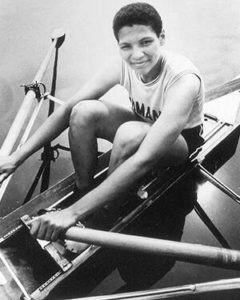
Anita at 1976 Olympics (teamusa.org)
Anita was close to graduating from college soon, however, and planned to go to law school. In fact, she had already been accepted at the University of Pennsylvania Law School for the next fall. Most athletes who hoped to compete in the Olympics trained on a full time basis. She had a decision to make — should she train full time or go on to law school?
Anita decided to try to do both. After moving to Philadelphia, she began training at the Vesper Boat Club, a prestigious club which has trained many Olympic athletes. She felt her minority status in training, however — she was the only woman who wasn’t white.
The inaugural competition for women’s rowing at the 1976 Olympic Games had 6 events. And each athlete could compete in only one event. Anita trained for three events in Boston for about one month during the US National Team tryouts. It was tough competition, but she made the crew of the 8-seat shell. She was going to the Olympics!
The US National Team left for Montreal straight from Boston. When they arrived, however, there weren’t enough US National Team uniforms for the women’s rowing team. Since Anita was elected team captain, it was her job to advocate for them and make sure everyone had the gear they needed and deserved. And she was persistent — it took over a year for the entire team to receive all their Olympic gear.

Anita at 1976 Olympics (ioc.org)
Anita’s life changed when she entered the Olympic Village in Montreal. There was a vibe of respect for all other athletes, regardless of race or nationality. It was a true community, which made her realize that it is possible for different people to live together in peace.
The rowing team began their events the day after Opening Ceremonies. The 8-seat shell did well enough in the first two heats to qualify for the final race. It was a windy day and they were in the outside lane. They rowed in white caps. But they persevered and came in third. Anita was proud to earn a bronze medal.
After she returned from the Olympics, Anita became convinced that she could do better. She was determined to try for the gold at the 1980 Moscow Games. She continued to train in Philadelphia for the remainder of law school and a few years after graduation. While she was a member fo the US National Rowing Team from 1975-1980, Anita won six national championships and a silver medal at the 1978 World Rowing Championships. She was ready to go for the gold. And she couldn’t wait to return to the Olympics!
Brains, Heart & Courage
Anita has a rich family heritage of activism. Her ancestors fought for their rights and pushed for change. And her parents were involved in the civil rights movement. Through their examples, Anita learned the importance of speaking up for herself and advocating for her beliefs, regardless of the personal cost.
When she was four years old, Anita started on a community swim team at a Douglas Park. She was usually the only girl on the team and continued through elementary school. Her father wanted her and her brother to become Olympic swimmers, which broadened her view of what was possible.
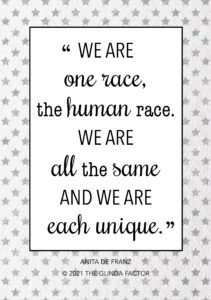 Once Anita reached high school, however, she was forced to the sidelines. Short Ridge High School had no sports teams for girls. And it bothered her. She wasn’t content watching her brothers play sports. She wanted to play.
Once Anita reached high school, however, she was forced to the sidelines. Short Ridge High School had no sports teams for girls. And it bothered her. She wasn’t content watching her brothers play sports. She wanted to play.
Other than being excluded from sports, Anita had a great high school experience. Short Ridge High School was an integrated high school that was an oasis in the segregated and racist community of Indianapolis.
After graduating from high school, Anita attended Connecticut College on a partial scholarship. Even though it wasn’t her first choice of colleges, it was the perfect fit. She became involved in student government and various clubs. Before long, Anita emerged as a leader on campus — she was sophomore class president, chairman of the student judiciary committee, author of a student bill of rights, and dorm supervisor.
When she was a freshman, Anita tried out for the women’s basketball team. She hadn’t played before, but was coordinated and willing to learn the rules. And she was almost 6 feet tall. Anita picked up the rules of the same quickly and loved being part of a team. But then, Anita passed a recruiting display booth for the rowing team during her sophomore year. And her life changed forever.
Glinda’s Gallery
Just the Facts
- Anita Lucette DeFrantz was born in Philadelphia, Pennsylvania, on October 4, 1952. She grew up in Indianapolis with three brothers. Her mom received a bachelors, and then masters degree, in speech therapy. She eventually went back to school for a PhD and was a source of inspiration for Anita.
- Anita majored in philosophy at Connecticut College and graduated in 1974. Then she attended University of Pennsylvania Law School and graduated in 1977.
- After law school, Anita worked as an attorney in a juvenile law center in Philadelphia.
- Anita served as vice president of the International Rowing Federation from 1993-2013.
- Anita was elected to the United States Olympic & Paralympic Committee board of directors and served from 1976-1985.
- Anita worked full-time to make the 1984 Olympic Games in Los Angeles a success. After the LA Games, she served as president of the LA84 Foundation, which invested LA’s share of the proceeds from the Games into community and youth sports programs in Southern California. She was president of the LA84 Foundation for over 25 years.
- Anita was elected a member of the International Olympic Committee in 1986 and has served ever since. She was the first woman and the first African American to represent the United States on the IOC. She was elected to the IOC Executive Board twice and served as IOC vice president from 1997-2001. She also served on four IOC commissions – Finances, Legal Affairs, Olympic Channel and the Coordination for the Tokyo 2020 Games – and is an honorary member of the Women in Sport Commission.
- Anita received the IOC’s Olympic Order, the highest honor of the Olympic Movement, for her advocacy on behalf of athletes during the boycott of the 1980 Olympic Games.
- In 1991, she was formally diagnosed with Multiple Sclerosis.
Want to Know More?
De Franz, Anita and Josh Young. My Olympic Life: A Memoir. New York: Klipspringer Press, 2017.
International Olympic Committee (https://olympics.com/ioc/ms-anita-l-defrantz)
Team USA (https://www.teamusa.org/About-the-USOPC/Leadership/Board-of-Directors/Anita-L-DeFrantz)
Anita L De Franz website (https://www.anitadefrantz.com)
